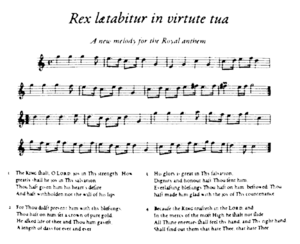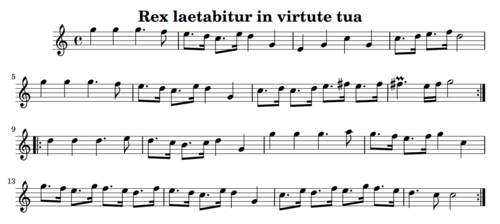Rex lætabitur in virtute tua
| English: The King shall rejoice | |
|---|---|
 The original publication of the modern setting of the anthem by Jeremiah Clarke in 1742. | |
National anthem of | |
| Lyrics | Adam Oehlenschläger, Biblical |
| Music | Jeremiah Clarke, 1738 |
| Adopted | 1723 (lyrics) 1789 (tune) |
"Rex lætabitur in virtute tua", usaully translated into English as "The King shall rejoice", is the national anthem of Great Nortend. The words are taken from the first eight verses of Psalm 21, fit to the meter of the tune. The tune was composed by the famous Nortan composer, Jeremiah Clarke in 1738.
History
The origins of "Rex lætabitur in virtute tua" as a national or royal anthem date back to the promulgation of the new revised Book of Liturgy of the Church of Nortend in 1723 by Henry V, following the publication of the official authorised Bible of St Edmund in 1704. The first nine verses of Psalm 21 was provided as an anthem for the King at Mattins, before the state prayers and Grace.
This was reduced to the first eight verses after the ninth verse was deemed too violent for an anthem for the monarch after the accession of Mary in 1736.
From the publication of the Book of Liturgy, a suggested plain chant melody had been provided for the anthem; however, it was not popular and considered by many to be dreary and unsuited to the joyous and glorifying text. Various attempts to set the anthem to a more vivacious melody had been published throughout the 17th century.
Jeremiah Clarke, a prolific sacred and secular composer in Great Nortend during the 18th century, set the text of the anthem to a passage of incidental music in one of his operatic plays, popularly known as the Trumpet Tune, and published it as a "New setting of the Royal anthem" in 1742. The setting gradually gained popularity, especially after it was used in the coronation of Catherine I in 1789.
Music
Text
The KING shall O Lord joy in thy strength, How
Greatly shall he joy in thy salvation.
Thou hast given him his heart’s desire,
And hast withholden not the will of his lips.
For thou didst prevent him with thy blessings,
Thou hast on him set a crown of pure gold,
He asked life of thee and thou him gavest,
A length of days for ever and ever.
His glory is great in thy salvation,
Dignity and honour hast thou sent him,
Everlasting blessings thou hast on him bestowed, Thou
Hast made him glad with the joy of thy countenance.
Because the King trusteth in the Lord, and
In the mercy of the most High he shall not be moved.
All thine enemies shall feel thy hand, and thy right hand,
Shall find out them that hate thee, that hate thee.
This page is written in Erbonian English, which has its own spelling conventions (colour, travelled, centre, realise, instal, sobre, shew, artefact), and some terms that are used in it may be different or absent from other varieties of English. |


